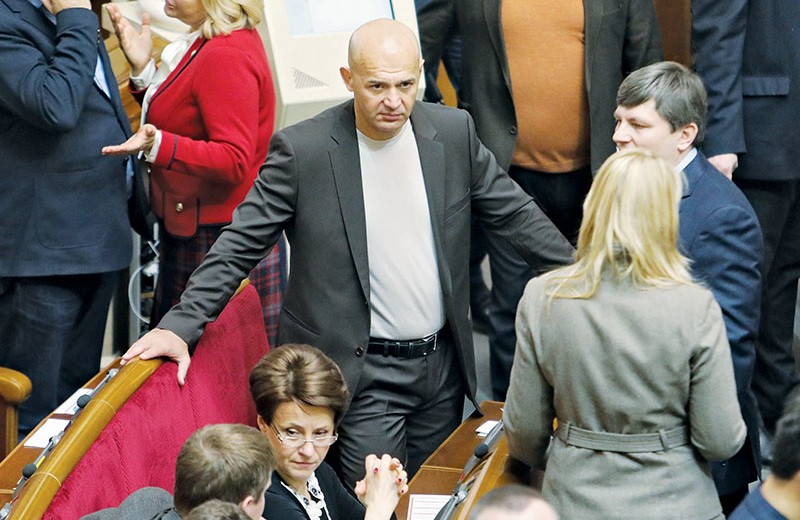Associates of President Petro Poroshenko are being investigated for allegedly skimming profits from state companies through supply contracts.
As Russia’s war against Ukraine rages on in its fourth year, the president and his protégés stand accused of profiteering from the defense industry. Firms controlled by them have received lucrative military contracts.
Another bone of contention is the controversial Rotterdam+ coal supply scheme introduced by the energy regulator controlled by Poroshenko. The scheme has allowed coal suppliers, power companies and Poroshenko’s investment bank to earn through soaring energy and bond prices.
The president denies all accusations of graft.
In March the National Anti-Corruption Bureau of Ukraine charged State Fiscal Service Chief Roman Nasirov, a protégé of the president, with illegally suspending taxes for gas trading companies of runaway lawmaker Oleksandr Onyshchenko. Onyshchenko has claimed that Poroshenko had instructed Nasirov to delay the tax payments.
Poroshenko has denied all of Onyshchenko’s accusations, calling him a tool of the Kremlin, while Nasirov believes his case to be fabricated and political.
The NABU is also investigating Poroshenko’s top allies, lawmakers Ihor Kononenko and Oleksandr Hranovsky, and Olga Tkachenko, an ex-aide to Hranovsky, in a graft case linked to the state-owned Odesa Portside Plant, a fertilizer maker. Tkachenko is an ex-member of the plant’s executive board.
Oleksandr Vizir, an aide to Kononenko, became a member of Odesa Portside Plant’s board of directors in 2016.
Onyshchenko claims he had been paying Hr 2,000 per 1,000 cubic meters in kickbacks to Kononenko from his company’s natural gas supplies to the Odesa Portside Plant and state-owned power producer Tsentrenergo, which Kononenko denies.
Before quitting in February 2016, Economy Minister Aivaras Abromavicius also accused Kononenko of trying to install his proteges at his ministry and many state firms.
One of the proteges, Andriy Pasishnik — ex-executive director of oil and gas giant Naftogaz — is currently on trial on charges of trying to influence a state official. Kononenko denies Abromavicius’ allegations.

The Odesa Portside Plant is at the center of a corruption case in which Ihor Kononenko and Oleksandr Hranovsky, top allies of President Petro Poroshenko, are being investigated. (Volodymyr Petrov)
War profiteering?
Poroshenko and his associates have also been accused of profiteering from supplies to the military, which they deny.
The Rybalsky Kuznia shipyard, which Poroshenko owns with Kononenko, got government contracts, including military ones, worth $2.5 million in 2016 and $560,000 in 2017, public data shows.
Oleh Hladkovsky, Poroshenko’s business partner, is a deputy secretary of the National Security and Defense Council with enormous clout over the defense industry.
Hladkovsky has managed to receive several lucrative military contracts for his automaker Bohdan, which was formerly co-owned by Poroshenko. These include supplies of MAZ trucks, 60 military ambulances worth $2 million, as well as Hyundai HD65 and Hyundai HD120 trucks, according to the Nashi Hroshi investigative journalism project.
Serhiy Krasulya, a Bohdan spokesman, argued that there was no conflict of interest because Hladkovsky was not involved in the company’s management despite owning it.
Roman Romanov, a former Bohdan dealer, heads state defense firm Ukroboronprom.
A report by the Institute of World Policy published in April mentioned “a pro-government lobby where several private companies either belong to those in power or are controlled by them and benefit from preferences in getting government contracts.”
“The biggest problem is that the defense sector is micromanaged,” said Valentyn Badrak, head of the Center for Army, Conversion and Disarmament Studies. “If some investor wants to come to Ukraine, he needs to go to four particular offices.”
Rotterdam +
Another highly controversial scheme is the supplies of coal under the Rotterdam+ formula, which was introduced last year by the energy regulator headed by Dmytro Vovk, a presidential protégé.
Although the coal is supplied from Russian-occupied areas in the Donbas and Dnipropetrovsk Oblast to other Ukrainian regions, its price includes the cost of alleged shipment from Rotterdam in the Netherlands and is unjustifiably high, according to analysts. As a result, the price of electricity from coal-fueled power plants has more than tripled since 2015. Lawmaker Sergii Leshchenko claims that Poroshenko and tycoon Rinat Akhmetov have reached a deal to introduce the scheme.
Akhmetov’s DTEK energy group has benefited from the high coal and power prices introduced by the Rotterdam+ scheme. DTEK denied accusations of wrongdoing, saying that the energy prices were fair.
Another beneficiary is state-owned power producer Tsentrenergo, which is allegedly linked to Kononenko, who denies the connection. Onyshchenko claims that Kononenko had been getting $20 per ton from coal supplies coming from Russian-occupied Donbas, which Kononenko denies.
The Rotterdam+ formula has also allowed ICU, an investment bank that services Poroshenko and is controlled by his allies, to earn $250 million, according to an investigation published by the Novoye Vremya magazine.
ICU purchased DTEK Eurobonds before the Rotterdam+ scheme was introduced and profited when their price soared due to the formula. The bank denies any wrongdoing, saying that the prices of other Ukrainian corporate bonds have also soared.
Pro-Russian politician Viktor Medvedchuk, who has enjoyed relatively good relations with Poroshenko, is also allegedly profiting from the scheme. According to an Ukrainska Pravda investigation, Hong Kong-based Arida, which is allegedly linked to Medvedchuk, has supplied coal from Russian-occupied areas to Tsentrenergo and passed it off as South African coal.
Meanwhile, since November the Security Service of Ukraine and the Prosecutor General’s Office have blocked imports of liquefied natural gas by dozens of traders, accusing them of financing terrorism.
Leshchenko claims the imports were blocked to promote the interests of Medvedchuk and Poroshenko’s inner circle. As a result of the SBU’s actions, the share of gas traders allegedly linked to Medvedchuk increased.
Medvedchuk’s spokesman Oleh Bovavin denied a link between Medvedchuk and the gas traders but could not comment on the Tsentrenergo scheme.



